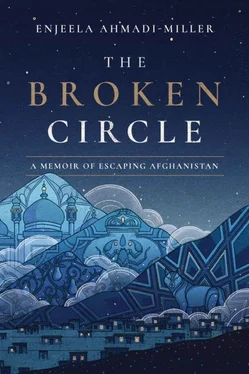Vida immersed me in her life. We continued going to her favorite markets, we played together after school, and on Saturdays we went to her favorite movie house not too far from our house. New Bollywood movies came out every week, and each of them had dancing and singing that mesmerized us. I remembered the Indian movie that Noor used to play in the kitchen while he worked on the family meals. How cheerful and upbeat it was. But here in India, music gave occasion for dancing, and dancing was a large part of the story in every movie.
At home, Vida would imitate the dance moves she had seen on the screen. She had been taking dance lessons for a few years now, and it was easy for her to pick up new routines; she was so lithe and coordinated. The whole family marveled at her skill.
At her dance school, she participated in every recital, and we attended them as a family, clapping and cheering for her as she danced. She usually played the lead role, dancing with beauty and grace beyond her age.
Vida inspired me to take singing lessons. When I told her about my idea, she urged me on. My parents found a reputable teacher, and I went once a week after school. The lessons not only developed my voice but helped me overcome my fear of performing in front of people. When it came to recital time, my parents and Vida were always in the front row, clapping and carrying on. I had never imagined I would do such a thing in front of so many people, but afterward I felt like a millionaire because of all the attention.

One afternoon I went into the kitchen for a snack and found Padar leaning over a newspaper that lay spread out in front of him. He rested his head in his hands with his elbows propped on the table. He seemed to be studying the classified ads, but he only stared straight at the paper as if he were having difficulty reading the page. I knew he had been looking for work all the months we had been in New Delhi, without much success. His demeanor reminded me of days in Nepal when he had waited for Ram’s return from India. He had become taciturn, withdrawn, unwilling to talk much about what worried him. When one of us tried to speak with him about it, he would brush us off.
We lived so well here, yet neither he nor Mommy worked. Before all the mess with the Soviets and having to leave Kabul, he had always worked. I didn’t remember a time that he wasn’t busy taking care of his properties or attending to business at the embassy, where he translated.
I’d often seen him in here in the evening with the paper spread out like this on the table. Now all he could do was stare at it, as if he were trying to figure out what to do. I stood by the refrigerator, wondering if opening it would disturb him. He was oblivious to my presence. I opened it and poured myself a glass of milk. He didn’t move, so I cleared my throat.
“Enjeela,” he said, glancing over at me with a half-hearted smile. “How was school today?”
Before I could answer, he began rubbing his chin with his knuckle, his eyes averted as if deep in thought. I went over and touched his hand, and this brought a smile to his lips. His frown lightened up, and he became instantly cheery, quizzing me about my day.
“Any luck finding a job?” I asked.
He patted my head. “Something good will turn up soon. There are many opportunities here. It’s difficult to decide what to do.” He spoke so positively, I wanted to believe not only his words but his intentions in giving me such a bright picture of our new world.
Later, after I went upstairs to get my books and begin my homework, I wondered why it was so difficult for him to find work. He spoke many languages and was the smartest man I knew. Surely something good would happen, like he had said. I knew he left the house every day, most days before Vida and I left for school. He kept very busy looking for just the right opportunity. I had no reason to believe his difficulties would last very long.
As the school year progressed, my Hindi became more fluent. I spoke it every chance I had, even practicing it at home with Padar. A new way of practicing my language skills began to take shape that year when I discovered boys. For the past five years, my brother had been my constant companion, and I had played with boys in the camps and villages, so it wasn’t out of shyness that I didn’t speak to them. No one would ever have accused me of being shy. I thought of boys like I thought about my brothers: they were a lot of help when you needed them and annoying inconveniences the rest of the time. I just wasn’t that interested. Until I met Raj.
What I had not noticed about them before this was how charming and cute certain boys could be. Especially if they made me laugh. Raj was tall with black hair, an attractive smile, and a beguiling sense of humor.
After school I often pedaled my bicycle, the one Padar had purchased for me, to one of the nearby parks. New Delhi is a city of parks. Everywhere you drive or walk, there is a carefully landscaped park, each one distinctive, with trees, flowers, lawns to play on, walkways, and more.
Raj and I would sit under one of the spreading oaks or ride our bikes along the path and simply talk. I enjoyed his friendship very much, and it was with his companionship that I realized boys were more than mere annoyances and could be very pleasant to have around. My new home was beginning to feel more comfortable in so many different ways.
Since the days of my sister Shahnaz’s fairy-tale wedding to the very handsome Saleem, I had dreamt of having a wedding like hers. In my darkest moments, I had fantasized about finding a prince who would sweep me off my feet and free me from all the drudgery and insecurity of my travels. Until that episode with Mina in that scrap of a village she lived and died in. Since then, those dreams had faded. I hadn’t thought much about the possibility of weddings and fairy tales until one of our neighbor’s daughters became engaged.
A sense of anticipation rippled up and down the block. It became apparent to me that weddings in India were events the entire community looked forward to. A shaadi , or Indian wedding, is as much about uniting families as it is about the bride and groom’s marriage. It’s not unusual to have hundreds, even thousands of guests.
The ritual traditions were quite elaborate, and the family and friends were busy for days decorating the street outside the bride’s home—the trees, gates, fences, cars, and even the homes were festooned with lights and flowers. Tents were set up along the sidewalks for guests. One large tent was set in front of the house, where the bride and her family would welcome the groom.
The day of the wedding, the street was blocked off to cars, and guests arrived early to greet the bride. Then they filtered outside to the tents. Some lounged on pillows under the tents, others around tables and chairs, visiting and relaxing. Singers strolled the street, and music was everywhere.
By the time we arrived, our neighbor’s house was already full of relatives. Vida and I wore shimmering shalwar kameez of yellow and orange silk that Mommy had made just for the occasion. She had done our hair up in plaits and buns, and I wore brand-new sandals. The house was packed with guests, and the bride sat in the middle of the living room, where her mother and sisters decorated her hands and feet with mehndi . She wore an elegant red sari. Sparkling diamonds and brilliant gold jewelry decorated her head, arms, and neck, and every finger had several gold rings. Her mother and aunts doted on her, fastening bracelets, adjusting necklaces, making certain her hair was just so. Watching her, I felt magically transported to a time when love and happiness existed not as a dream but in real life.
Читать дальше













